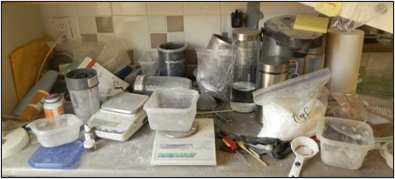Emergency Response Research Webinar Series

Free webinars typically held on the second Wednesday of the month. Special webinars on COVID-19 research are conducted as research results become available.
EPA hosts this webinar series to share current research activities and results. This webinar series covers the latest information on research supporting EPA's response to chemical, biological, and radiological incidents, as well as natural disasters. This forum allows EPA to communicate directly with partners and stakeholders to foster collaboration and dissemination of information.
NOTE: Attendees have the option of receiving a certificate of attendance. Acceptance of certificates is contingent on organization requirements—EPA cannot guarantee acceptance. Closed-captioned recordings of the webinars are provided below for later viewing and as a training resource; certificates cannot be provided for viewing webinar recordings.
Webinar dates and topics are subject to change.
On this page:
Upcoming Webinar
Cleanup of Fentanyl Contaminated Surfaces and Associated Waste Management
Wednesday, February 11, 2026, 2:00 - 3:00 PM ET

Illicit fentanyl activities create exposure risks to the general public who unknowingly enter contaminated areas, along with law enforcement, first responders, and remediation contractors who encounter contamination during their official duties. Remediation operations will benefit from improved knowledge of on-site approaches for decontamination or disposition of building materials contaminated with fentanyl and its analogs. Any residual liquid waste containing fentanyl after decontamination may require proper handling and/or treatment prior to disposal. Disposal options for fentanyl contaminated solid waste are limited to incineration.
This webinar provides an overview of EPA’s role in fentanyl responses and discusses decontamination approaches that fill gaps identified during the development of EPA’s Fentanyl Fact Sheet for On-Scene Coordinators. Options to treat fentanyl contaminated liquid waste will be discussed, as well as an overview of EPA’s role in defining waste disposal options. This webinar is of interest to the EPA response community, as well as other federal, state, Tribal and local agencies.
About the Presenters

Lukas Oudejans is a Physical Scientist with the US EPA Office of Land and Emergency Management (OLEM)’s Environmental Response Team and CBRN Division. Over the past 17 years with US EPA, he gained vast experience in national security programs related to research, development and evaluation of innovative technologies for the decontamination of materials contaminated with chemical or biological agents. He is co-author of EPA’s Fentanyl Fact Sheet for US EPA Federal On-Scene Coordinators who are providing technical support to state and local responders who may encounter environmental contamination from the fentanyl class of synthetic opioids (including fentanyl analogs). Currently, he leads the workgroup that develops the National Response Team quick reference guides for chemicals (including fentanyl) and continues to lead research efforts to assess decontamination options for fentanyl analog contaminated building materials. Dr. Oudejans holds a Ph.D. in Experimental Physics from Radboud University, Nijmegen, The Netherlands (1994).

Matthew Magnuson is a Research Chemist for EPA’s Office of Applied Science and Environmental Solutions – Emergency Response Science Branch. He received his Ph.D. in Chemistry in 1994 from the University of Oklahoma (Norman) and is currently involved in emergency response research related to analysis and environmental fate of chemical, biological, and radiological (CBR) contaminants. A major focus of his work is management and treatment of large volumes of CBR contaminated water and wastewater, as well as resuspension and stabilization of radiological contaminants. Collaborations include US Department of War, US Department of Homeland Security, and the National Institutes of Justice.

Kristin Fitzgerald has been with the US EPA since 2001, working primarily on sector-based rulemaking for hazardous waste generators. Kristin started working with the Resource Conservation and Recovery Act (RCRA) over thirty years ago, answering questions on the RCRA/Superfund Hotline. More recently, Kristin has been working on hazardous wastes that pose unique challenges, including hand sanitizer, solar panels and e-cigarettes. She holds a B.A. in Government from St. Lawrence University in New York and an M.S. in Environmental Science and Policy from George Mason University in Virginia.
2026 Schedule
If you are interested in being notified when new webinars are scheduled, please sign up to receive email notifications here: Receive emails for upcoming webinars.
Topic and presenters are subject to change. Additional information and registration links will be provided in advance of each webinar.
| Date | Topic |
|---|---|
| February 2026 | Topic Coming Soon! |
Past Webinars
Recordings and other materials from past webinars are available below. Recordings are hosted on EPA's YouTube channel. Certificates cannot be provided for watching the webinar recordings.
| Date | Topic and Presenter(s) |
|---|---|
| July 9, 2025 | Animal Carcass Disposal for a Foreign Animal Disease Outbreak Presenters: Joseph Wood, Office of Research and Development; Shannon Serre, Office of Land and Emergency Management |
| June 11, 2025 | Assessing Lithium-ion Battery Discharge and Measuring Emissions Presenter: Souhail Al-Abed, Office of Research and Development |
| May 14, 2025 | AI in Disaster Preparedness, Response, and Recovery Presenter: Timothy Boe, Office of Research and Development |
| April 9, 2025 | Leveraging Stormwater Modeling to Prepare and Recover from Emergencies Presenter: Anne Mikelonis, Office of Research and Development |
| March 12, 2025 | Managing Contaminated Drinking Water Post-Hurricane Presenter: Chelsea Hintz, Office of Research and Development |
| February 12, 2025 | Cleaning up Soil Contaminated with Pathogens Presenters: Joseph Wood, Office of Research and Development; Shannon Serre, Office of Land and Emergency Management |
| December 11, 2024 | Local Partnerships: Developing Solutions for Rapid Needs Presenters: Helen Buse, Office of Research and Development; Jatin Mistry, EPA Region 6 |
| November 13, 2024 | Protective Actions & Decontamination: Radiological Incident Response Presenters: Matthew Magnuson, Office of Research and Development; Ken Yale, Office of Radiation and Indoor Air |
| October 9, 2024 | EPA's Water Security Test Bed: Critical Infrastructure Research Presenter: Jeff Szabo, Office of Research and Development |
| September 11, 2024 | Wildfire Impacts on Water Infrastructure Presenters: William Platten, Office of Water; Samantha Bishop, EPA Region 9; Levi Haupert, Office of Research and Development |
| August 14, 2024 | Testing Chemical Warfare Agent Response in a Realistic Setting Presenters: Lukas Oudejans, Office of Research and Development; Shannon Serre, Office of Land and Emergency Management; James Justice, EPA Region 5 |
| July 10, 2024 | Clean Water Access During Emergencies Presenters: James Goodrich, Office of Research and Development and Dave Carney, Kentucky's Department for Public Health |
| June 12, 2024 | EPA's Wind Tunnel: Modeling Urban Wind Flow & Dispersion Presenter: Michael Pirhalla, Office of Research and Development |
| May 8, 2024 | Pathogen Contaminated Wastewater: Where Does it Go & How to Treat it Presenter: Adam Burdsall, Office of Research and Development |
| April 10, 2024 | Oil Spill Response: Advances in Detection Capabilities Presenter: Robyn Conmy, Office of Research and Development |
| February 14, 2024 | Protecting Drinking Water Sources with EPA's River Spill Model Presenters: James Goodrich, Office of Research and Development and Sam Dinkins, Ohio River Valley Water Sanitation Commission |
More Webinars
Special Topics
Cleanup, Remediation & Decontamination
- Toxic Aromatherapy: A Melioidosis Mystery (2023)
- Fentanyl Decontamination (2023)
- Clean or Replace? Decontaminating PFAS from Firefighting Equipment and Hangars (2022)
- Considering Trade-offs in Contamination Cleanup (2022)
- Readily Available Equipment for Response and Recovery (2021)
- Neutralization and Attenuation of Ricin Toxin (2019)
- Decontamination Strategy and Technology Selection Tool (DeconST) (2014)
- Remediation of Soils Contaminated with Bacillus anthracis Spores (2014)
Large Scale Demos
- Analysis for Coastal Operational Resiliency (AnCOR)-Wide Area Demonstration (2023)
- Underground Transportation Restoration Research (2018)
- Responding to a Chemical Warfare Incident: From Sampling and Analysis to Decontamination and Waste Management (2017)
Community Resilience & Social Science
- Equitable Resilience Builder (2023)
- Building Relationships and Trust in Contamination Cleanup (2023)
- Environmental Resilience Tools Wizard (2021)
- Promoting Community Resilience through Social Science (2021)
Sampling & Analysis
- Innovative Sampling for Large-Scale Biological Outdoor Contaminated Events (2023)
- Facilitating Coordinated Response from Field to Lab: the Environmental Sampling and Analysis Methods (ESAM) Program (2022)
- Biothreat Agent Detection: Advances in Rapid Analytical Methods (2021)
- Virtual Reality: A Training Tool for Biological Sampling (2020)
- EPA's Environmental Sampling and Analytical Methods for Environmental Remediation and Recovery (2018)
- Water Security and Resiliency (2018)
- USGS/EPA Collaboration: Bacillus anthracis in American Soils: From Sample Collection to Data Application (2014)
COVID-19 Research
- COVID-19: Evaluating Aerosol Treatment Technologies (2022)
- COVID-19: Aerosol Treatment Devices & Ozone Disinfection (2021)
- COVID-19: Electrostatic Sprayers and Foggers for Disinfectant Application (2021)
- Reducing Environmental Exposure to SARS-CoV-2: An Overview of Findings (2021)
- COVID-19: Cleaning & Disinfecting of PPE for Effective Reuse (2021)
- COVID-19: UV-C Devices and Methods for Surface Disinfection (2021)
- COVID-19 Long Lasting Disinfectants (2020)
- EPA Expands Research on COVID-19 in the Environment (2020)
Oil Spills
Waste Management
- Incident Waste Decision Support Tool (I-WASTE) Training (2024)
- Waste Estimation Case Studies to Support Planning for Natural and Manmade Disasters (2023)
- Pre-Incident Planning for CBRN Waste Management (2022)
- Incident Waste Decision Support Tool (I-WASTE) (2020)
Data Management
Wildfires and Natural Disasters
- Underground Storage Tanks: Preparing and Responding to Extreme Events (2022)
- Remediating Premise Plumbing Following a Water Emergency or Disaster (2022)
Water Security
- Tools, Training and Technical Assistance to Increase Water System Resilience (2024)
- Cybersecurity (2023)
- Building Resiliency: Emergency Water Treatment System (2021)
- Water Network Tool for Resilience (2020)
- Removal of Organic Contaminants from Polyethylene Drinking Water Pipes by Flushing (2018)
- Premise Plumbing Research in EPA's Homeland Security Research Program (2018)
- Water Security and Resiliency (2017)
- EPA's Water Security Test Bed (2015)
- TEVA-SPOT Consequence Evaluation Module and EPA-RTX (2014)
